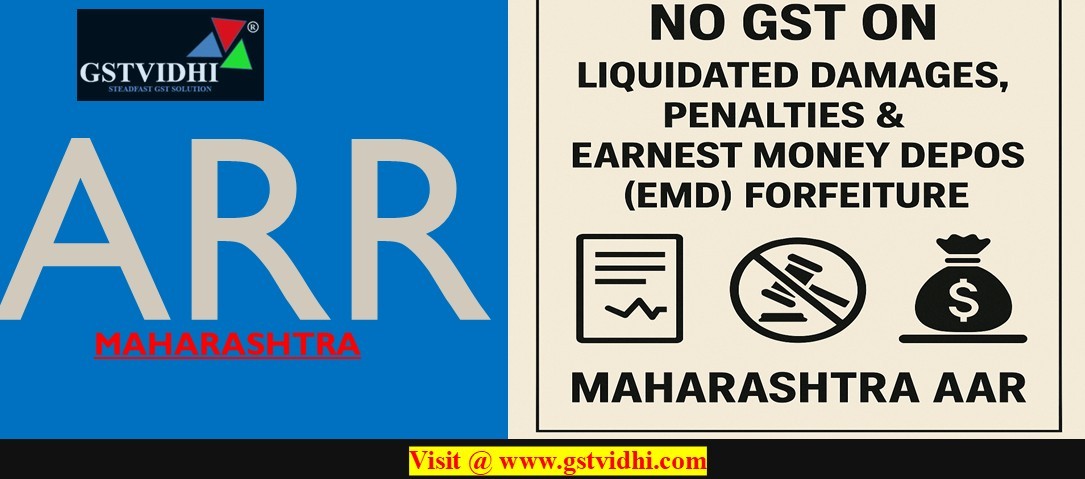
No GST on Liquidated Damages, Penalties & Earnest Money
Deposits (EMD) Forfeiture: Maharashtra AAR Relief for MSETCL
Introduction:
In
a significant relief for public sector undertakings and government entities,
the Maharashtra Authority for Advance Ruling (AAR) has ruled that liquidated
damages, forfeiture of EMD/security deposits, write-back of balances, and
penalties collected by M/s Maharashtra State Electricity Transmission
Company Ltd. (MSETCL) are not subject to GST. The ruling was
delivered on 22nd April 2025 under Order No. GST-ARA-31/2024-25/B-202.
Case
Details
- Applicant: M/s Maharashtra State
Electricity Transmission Company Ltd.
- GSTIN: 27ZAAECM2936N1Z2
- Order No.: GST-ARA-31/2024-25/B-202
- Date of Ruling: 22.04.2025
Background: MSETCL, a government-owned company engaged
in the transmission of electricity across Maharashtra, approached the AAR to
seek clarity on the applicability of GST on recoveries such as liquidated
damages for contract delays, forfeiture of earnest money deposits (EMDs),
and penalties imposed on contractors. The company also sought
clarification on write-backs of old creditor balances and expired
security deposits that were unclaimed for over three years.
The applicant submitted
that these amounts are not received in exchange for any service but are
deducted or written back due to non-performance, defaults, or prolonged
inactivity. Hence, they do not qualify as “supply” under Section 7 of the CGST
Act and should not attract GST. MSETCL emphasized that its primary activity — electricity
transmission — is exempt from GST, and the penalties imposed are merely
tools to enforce contractual discipline, not revenue-generating services.
Importantly, MSETCL
relied on CBIC Circular No. 178/10/2022-GST dated 03.08.2022, which
clarified that damages or compensation paid for breach of contract are not
to be considered as consideration for supply. The circular explained that
where a party breaches a contract, and the other party imposes a penalty or
withholds an amount as compensation, there is no supply of service involved,
and thus such amounts are not taxable under GST.
Questions
Before AAR
1. Is
interest receivable on deferred payments in Equated Yearly Installments
under the annuity model liable to GST?
2. If
yes, what is the classification of the service and the applicable GST
rate?
Submissions
by Applicant
- The interest component arises due to deferred
payment of consideration, and hence it should form part of the transaction
value as per Section 15 of the CGST Act.
- The original supply was that of road
construction services, and interest should be taxed at the same
rate as applicable to the original supply.
Key Legal
Provisions Considered
- Section 15(2)(d), CGST Act:
“The
value of supply shall include interest or late fee or penalty for delayed
payment of any consideration for any supply.”
- CBIC Circular No. 221/15/2024-GST
(Para 4):
“As
the instalments/annuity payable by NHAI to the concessionaire also include some
interest component, the amount of such interest shall also be includible in the
taxable value…”
AAR’s
Analysis and Findings
After reviewing the
submissions and relevant legal provisions, the AAR examined each type of
transaction:
1. Liquidated
Damages for Breach or Delay: The AAR held that these are imposed
to discourage delays and enforce performance and are not in the nature of
consideration for tolerating a breach. Therefore, they are not “supply” under
GST.
2. Liquidated
Damages for Deposit/ORC Works: Similar to above, these
amounts are not linked to any underlying supply of goods or services and hence
are not taxable.
3. Forfeiture
of EMD/Security Deposits: The authority ruled that forfeiting
an EMD due to bidder’s failure to execute the contract is a penal action,
not a consideration for any tolerated act. Therefore, it does not qualify as a
taxable supply.
4. Write-back
of Old Credit Balances and Expired Deposits: These are mere
accounting adjustments where no goods or services are supplied or received. As
there is no transaction involved, such entries are outside the scope
of GST.
5. Penalties
for Breach of Contract Conditions: These penalties are
imposed to ensure that contractors comply with agreed terms. Since there is no
agreement to tolerate the breach (which is essential for taxability under Entry
5(e) of Schedule II), such penalties are not taxable.
The AAR categorically
ruled that all the above items do not constitute supply and are thus not
liable to GST. Therefore, it did not consider questions related to time of
supply, valuation, HSN code, or input tax credit availability, as they were
rendered irrelevant.
This ruling is consistent
with the CBIC’s stance and reinforces that liquidated damages, forfeitures,
and similar deductions are not taxable under GST unless there is a specific
contract to tolerate an act for consideration. The key distinction lies in intention
— if the amount is collected as a consequence of breach, it is not
taxable; but if the payment is made in return for a service (like
allowing cancellation, early exit, etc.), GST may apply.
Conclusion
The Maharashtra AAR has
reaffirmed that contract enforcement measures like penalties,
forfeitures, and write-backs are not services and hence do not
attract GST. This ruling provides much-needed clarity and relief to
government bodies, PSUs, and large infrastructure companies frequently dealing
with such contractual deductions.
For businesses, this
ruling offers a guideline to ensure that only genuine contractual damages
are kept outside GST, while payments made under mutual arrangements or
commercial tolerances should be carefully evaluated for tax implications.
Disclaimer: All the Information is based on the notification, circular advisory and order issued by the Govt. authority and judgement delivered by the court or the authority information is strictly for educational purposes and on the basis of our best understanding of laws & not binding on anyone.
Find the Attachment (Press on Click Here )
Click here